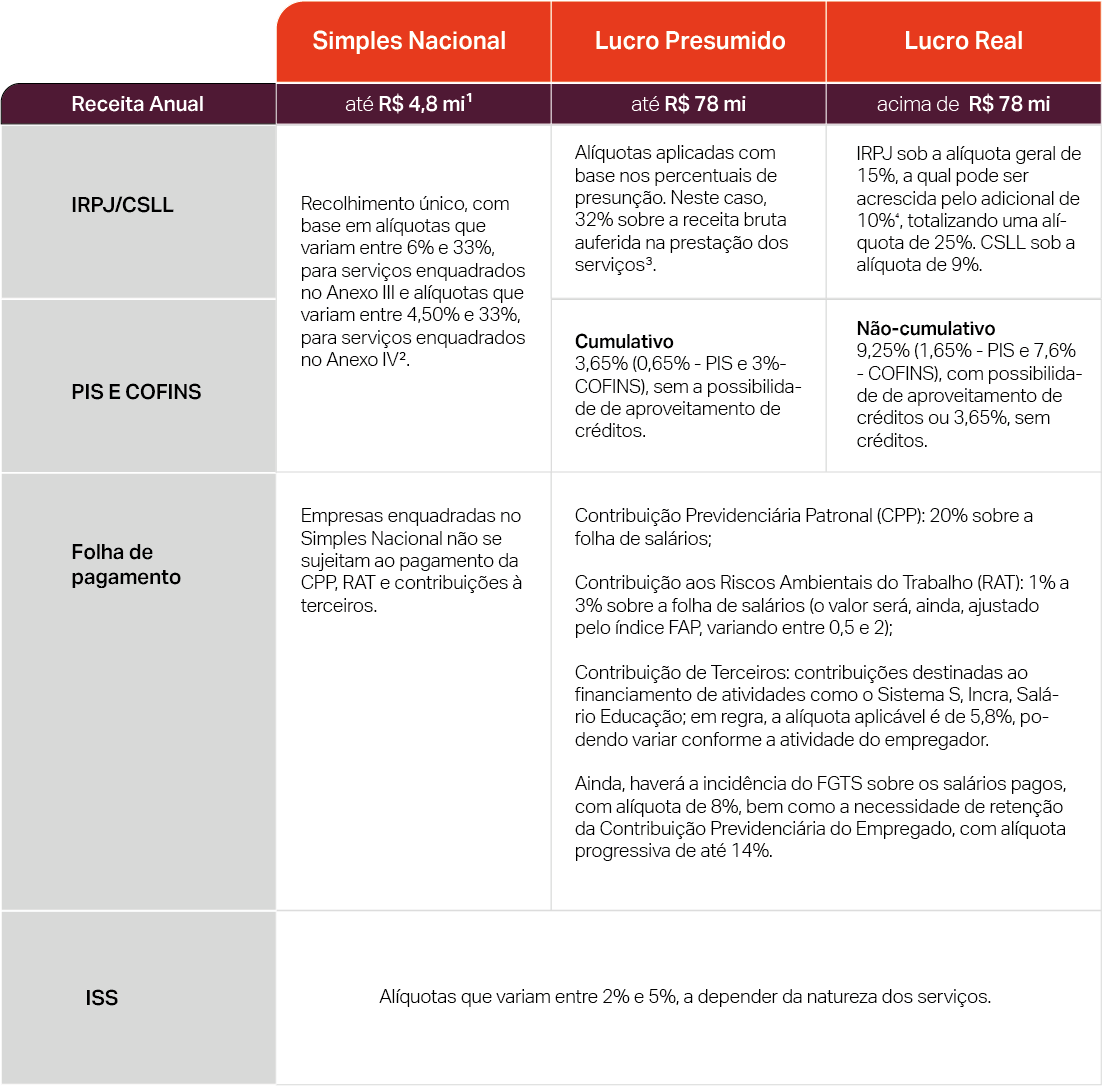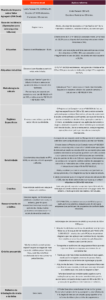What are fintechs?
Fintechs are companies that specialize in creating innovative financial solutions, focusing on fully digital financial products. The term comes from the abbreviation of two English words (financial and technology), which sums up the main objective of these institutions.
And all companies that develop digital financial solutions, duly regulated by the Central Bank, can be classified as fintechs.
Current tax regimes
Fintechs can opt for three tax regimes: Simples Nacional, Lucro Presumido or Lucro Real.
For each tax regime there is a specific tax burden. Below is a structured summary of the tax burden. Check it out!

[1] Sub-limit of R$ 3,600,000.00 created for the ISS hypothesis.
[2] It is worth mentioning that in order to calculate the tax due for the month, the taxpayer calculates the effective rate (gross revenue accrued in the last 12 months (x) rate set out in Annex II (-) portion to be deducted (/) gross revenue accrued in the last 12 months). Furthermore, if the ratio between payroll and gross revenue in Simples Nacional is less than 28%, Annex V will apply, which imposes higher taxation, with rates varying between 15.50% and 30.50%, according to the bands described (R Factor).
[3] It is important to note that some services can use the reduced rates, based on the exceptions provided for by law/instruction (such as Normative Instruction No. 1700 of 2017).
[4] Incident on the portion of profits that exceeds the annual amount of R$ 240,000.00 (equivalent to R$ 20,000.00 per month).
An interesting point to note about the development of technological financial services is the possibility of using tax incentives linked to research and development of technology, such as those related to the Lei do Bem (Law No. 11.196/2005), which provide for better improvement of the technologies used on Brazilian soil.
Impact of the Tax Reform on the service sector
The unification of taxes and the simplification of the collection system are positive steps.
In addition, the tax reform seeks to create less distortion in the economic effects of the production chain by adopting the Value Added Tax (VAT) system, i.e. taxpayers will have the full right to use credits and taxation at destination.
The adoption of Value Added Tax (VAT) allows companies to benefit from the right to a tax credit for all the taxes (IBS and CBS) levied in the previous chain, with the right to offset these amounts against the taxes (IBS and CBS) levied on the provision of services.
Complementary Bill 68/2024
The first bill to regulate tax reform has been approved by the Chamber of Deputies and is now heading for consideration by the Federal Senate and presidential sanction.
PLP 68/2024 is responsible for instituting the Tax on Goods and Services, the Social Contribution on Goods and Services and the Selective Tax. The basic text approved included an estimated 26.5% cap on the rate of the future Value Added Tax (VAT).
The proposal states that an assessment will be made in 2031 to check whether the sum of the CBS and IBS rates, which will come into full effect in 2033, will result in a figure higher than 26.5%. In the event that the value is higher than estimated, a new bill will have to be sent by the Executive Branch, in conjunction with the Management Committee, in order to propose a reduction in benefits for sectors or products.
What will change with the approval of the Tax Reform?
The tax will be levied at a maximum rate estimated at 26.5% of the company’s revenue. It is undeniable that the services sector will suffer a real increase in the tax burden.
To begin with, it can be seen that the approved tax reform text provided for the creation of a specific regime for financial services, which include: insurance and reinsurance, credit operations, foreign exchange, leasing, securitization, operations with real estate securities, capitalization, private pension plans, among others.
These tax regimes can offer differentiated rates and bases, IBS crediting options, as well as delimiting the incidence on revenue/billing or single-phase (use of a uniform rate throughout the national territory). The exception is for services “remunerated by fees or commissions”, which will be subject to the general CBS and IBS regime.
The provision of a differentiated regime may be good news for the sector, which has seen significant growth in recent years. However, as with other service sectors, it is undeniable that the reform will represent a significant increase in the tax burden, albeit at a lower level than other services.
With regard to the possibility of taking credits, it was decided that IBS and CBS will be credited on the acquisition of financial services that deal with financial intermediation by raising and transferring funds, foreign exchange transactions, securitization, faturization and securities and their derivatives, in addition to non-crediting on forms of intermediation, as long as they acquire the financial service with individualized consideration for the operation and identification of the acquirer (the basis will be the amount paid by the service provider).
With regard to the other credits, it will be necessary for the IBS Management Committee and the Brazilian Federal Revenue Service to recognize the payment of IBS and CBS in the operation.
Imported financial services are also subject to IBS and CBS at the same rate as services purchased in Brazil. When importing, the calculation basis will be the provider’s revenue, with the possibility of a reduction for presumed margins. If the importer is entitled to a deduction or credit on the acquisition of the same service, a zero rate will apply to the import.
Specifically for the financial sector, some points of the tax reform also draw attention and should be carefully observed:
- Taxation at destination – In principle, IBS will be taxed at destination, i.e. where the service is consumed. In this sense, it is possible that there will be debates/divergences regarding the distribution of revenue among the municipalities.
- Double taxation (IOF x IBS) – There has not yet been any express provision to change the rules governing the incidence of the IOF, which could lead to the double taxation of some services, given the concomitant incidence of the IBS.
The table below summarizes the main changes brought about by the approval of the text in the Senate compared to the current system:

The comparative table above shows the changes that could occur with the Tax Reform in the services sector, specifically for financial institutions/fintechs.
Did you like the content? We hope it has clarified what will change for fintechs with the Tax Reform.
If you have any questions, click here and talk to our team of experts.








